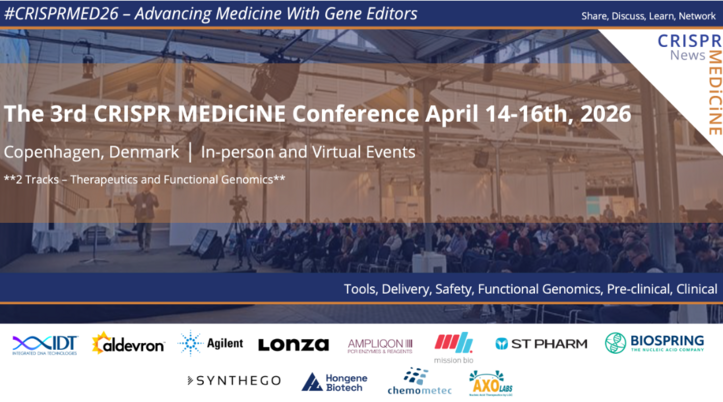CRISPR Trial Update: Editas Reports Positive Initial Data From Sickle Cell Disease and Beta-Thalassemia Trials
On Friday last, Editas Medicine reported positive initial safety and efficacy data from the first four patients with sickle cell disease (SCD), and from the first transfusion-dependent beta thalassemia patient treated with EDIT-301, in the ongoing RUBY and EdiTHAL trial, respectively.
EDIT-301 is an autologous (i.e. patient-derived) CRISPR-edited cell therapy candidate, which is designed to be a one-time treatment for SCD and BT. It works by reactivating foetal haemoglobin (HbF) production, thereby compensating for the lack of functional adult haemoglobin in individuals with SCD and BT (see Fact Box).
A single dose of EDIT-301 leads to persistant improvements in haemoglobin levels with no serious adverse events
Editas reports that of the first four patients dosed in the RUBY trial, Patients 1 and 2 reached normal haemoglobin levels five months post-treatment with EDIT-301, and both patients have maintained a normal haemoglobin level at ten- and six-months follow-up, respectively. These patients have also seen foetal haemoglobin levels of greater than 40% persist during the same time frame. Patients 3 and 4 saw increases in total haemoglobin and foetal haemoglobin at three and two months follow-up, respectively, that follow similar patterns as those seen in Patients 1 and 2. All four treated RUBY patients are also free of vaso-occlusive events since infusion.
In the EdiTHAL trial, the first patient demonstrated successful neutrophil and platelet engraftment, and, at one and a half months post-infusion, the patient’s response was reported to resemble that of the first four RUBY patients.
In both trials, EDIT-301 was reportedly well-tolerated and demonstrated a safety profile consistent with myeloablative conditioning with busulfan and autologous hematopoietic stem cell transplant. The company reports that no serious adverse events occurred after EDIT-301 infusion, and that no adverse events reported were related to treatment with EDIT-301.
Sickle cell disease, beta thalassemia, and foetal haemoglobin
Sickle cell disease (SCD) and beta thalassemia (BT) belong to a group of diseases known as the haemoglobinopathies, which are inherited disorders of globin, the protein component of haemoglobin.
SCD results from a single-point mutation in the haemoglobin subunit beta (HBB) gene and is associated with a range of symptoms and life-limiting complications. Vaso-occlusive crises (VOEs or VOCs) are the most commonly encountered complication in severe SCD, and these occur when small blood vessels get blocked because of sickled red blood cells which tend to be stiffer than healthy cells, and because the defective form of haemoglobin seen in SCD (haemoglobin S) renders the red blood cell membranes sticky.
BT belongs to group of diseases known as the thalassemias (a sub-group within the haemoglobinopathies), which are characterised by haemoglobin deficiency. BT may arise from >200 known mutations in the HBB gene. HBB mutations result in a shortage of mature and functional adult haemoglobin, leading to a spectrum of symptoms ranging from none at all to severe anaemia, depending on the exact HBB mutation(s) present.
Daily treatment for SCD and BT is limited to symptom control, dietary intervention and pain management, but gene-editing technologies unleash the possibility to cure a patient using their own cells. Central to many of the current approaches is foetal haemoglobin (HbF). HbF is highly expressed and critical during foetal development, but then rapidly suppressed early in life. Extensive research on the molecular mechanisms of the haemoglobinopathies has revealed ways in which HbF expression can be restored, and reactivation of HbF expression has since emerged as a dominating therapeutic strategy for SCD.
EDIT-301 is a CRISPR-Cas12a-edited cell therapy designed to reactivate foetal haemoglobin
Specifically, EDIT-301 is developed using a CRISPR-Cas12a ribonucleoprotein to enhance the HBG1/2 promoter region in the beta-globin locus of patient-derived haematopoietic stem cells (HPSCs). Naturally-occurring HbF-inducing mutations at the HBG1/2 region support the clinical relevance of using gene editing to enhance the HBG1/2 promoter, and this strategy has been shown to increase the red blood cell levels of HbF.
EDIT-301 was the first experimental medicine to be developed using CRISPR-Cas12a gene-editing technology, and dosing of the first patient in the RUBY trial in July 2022 marked the first time that Editas' engineered AsCas12a enzyme was used to edit human cells in a clinical trial.
In August 2020, Editas announced that it had obtained a Rare Pediatric Disease Designation for EDIT-301 as a potentially best-in-class treatment for SCD in children from birth to 18 years. The company obtained FDA clearance to initiate the RUBY trial in January 2022, and shared positive data from first two patients treated in the RUBY trial in December 2022.
We will provide further details on the RUBY and EdiTHAL trials as they emerge.
You can find all our previous news articles about IND approvals and clinical trials here. For a complete overview of CRISPR IND approvals and ongoing gene-editing trials, check out CRISPR Medicine News' Clinical Trials Database.
To get more CRISPR Medicine News delivered to your inbox, sign up to the free weekly CMN Newsletter here.
Tags
ArticleNewsClinical News UpdatesBeta ThalassemiaSickle Cell Disease, SCDTransfusion-Dependent Beta Thalassemia, TDTBlood diseaseEditas Medicine, Inc.
CLINICAL TRIALS
Sponsors:
Suzhou Maximum Bio-tech Co., Ltd.
Sponsors:
Zhejiang University







